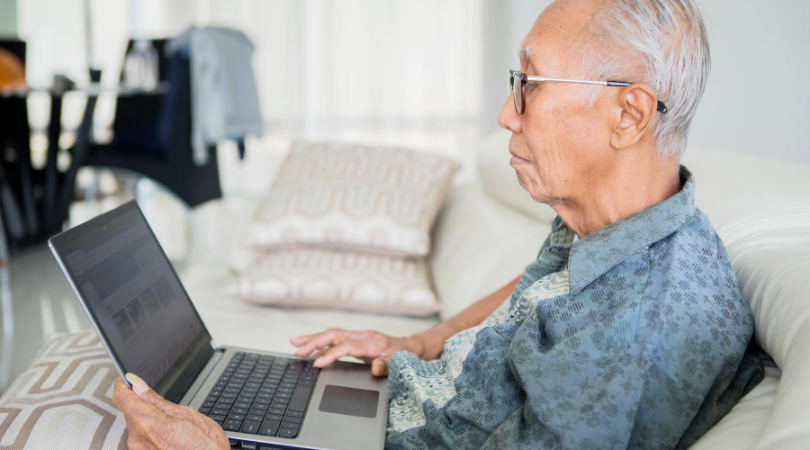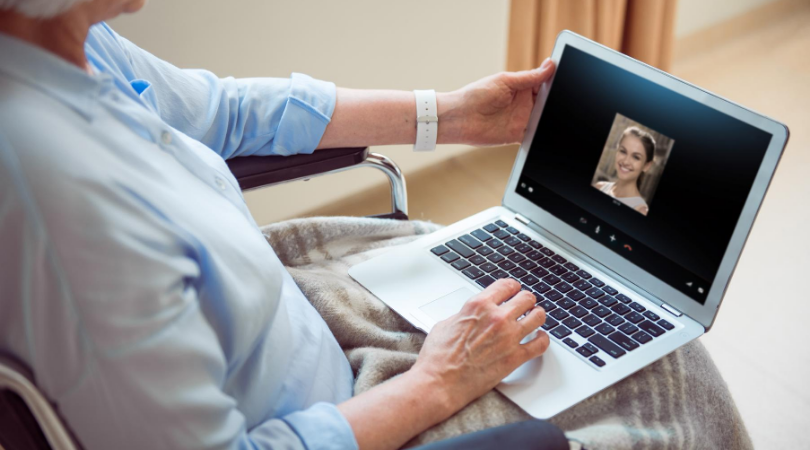Online Privacy Tips for Seniors
 Online tools are a wonderful way to keep in touch with loved ones, find information, and manage personal and professional business tasks. Since COVID-19 hit, it has become a lifeline for those of us staying safe at home.
Online tools are a wonderful way to keep in touch with loved ones, find information, and manage personal and professional business tasks. Since COVID-19 hit, it has become a lifeline for those of us staying safe at home.
We use the internet to chat with family and friends, pay our bills, and even order groceries and other supplies from the comfort of home. It’s not perfect, but it’s making things a little bit easier. Unfortunately, even in a time of worldwide crisis, there are those who will take advantage of others. Even in the comfort of our own homes, they reach out by phone, email, and Facebook Messenger. Senior citizens are frequent targets of these scams, as internet predators assume seniors will be less familiar with their tactics. We encourage you to use the tips below to protect yourself when on the internet.

How to Protect Yourself from Online Scams
Get into the habit of pausing before you click anything offered to you in an email or social media message. Even if the message appears to be from your bank or another business you know, don’t click the links inside it. Call the business or login to your account without being directed by an email link. If the news they have is that important, it will be waiting for you. Many scammers create emails and messages that look exactly like official communication. If you look carefully, you can usually see that the sender email address or the link address is a little bit off. But don’t take any chances. Just skip the links and reach out the business yourself.
Similarly, be wary of unexpected phone calls requesting personal information. If it really sounds important, end the call, then call the official phone number of the business yourself to gather more information. It may seem overly cautious, but the safest way to do business is when you instigate the conversation instead of them contacting you.

Be Cautious with New Online Friends
If you’re on social media or an online dating site, you may find yourself connected to new people that you’ve never met in person. This can be a nice way to meet people with similar interests, but be wary of anyone who asks you for personal information like a social security number, bank account details, or even your address or birthday.
Be especially concerned if they ask for money. It’s very easy for someone on the other end of a computer to tell a heartbreaking story that will have you tempted to open your wallet. They can fake photos and find enough details online to make you think you’re talking to someone your age in a nearby town when you’re talking to a teenager halfway around the world.
Don’t let your guard down around personal information even if you’ve been corresponding for months. Scam artists are patient. If the relationship is real, they won’t need your money. They’ll just enjoy your conversation.

Use Strong Passwords
It may be easy to remember your cat’s name, but these types of passwords are easy to guess. Choose strong passwords that include upper and lowercase letters, numbers, and symbols. Make your wireless router password protected and use different passwords for different accounts. This way, if one is accidentally compromised, the other accounts remain safe.
Be sure to change your passwords every few months just in case one of them is compromised. It is especially important to change banking and credit card account passwords often.
It can be hard to remember passwords especially if you change them regularly. If you have to write your passwords down, store that information far away from your computer. It may mean a few extra steps when you go to pay your bills, but it’s worth it to keep your personal information secure.

Setup Security Tools
The most important way to protect yourself is to be cautious in the information you share online. You can add to those good habits by installing software that provides added protection.
Make sure your firewall is always turned on. A firewall is virtual tool that prevents people outside your home from accessing information on your computer. Microsoft Windows comes with firewall protection, but you can also purchase security software from companies like Norton or Zone Alarm.
You should also install antivirus software and run it frequently to check for viruses that may have been received via email or through an unsafe website. Companies like McAfee, Symantec offer paid versions of this software. Windows users also have free access to Windows Defender antivirus software.
There will always be bad people in the world who try to take advantage of others. It happens on the internet, by phone, or even with a knock at your front door. People of all ages can fall victim to clever fraudsters. By being cautious about the information you share, you can save yourself a lot of trouble and stay safe online.
Crossroads Hospice & Palliative Care provides care and support to individuals facing a serious chronic or terminal illness. To leave more about our services, please call 1-888-564-3405.
If you found this information helpful, please share it with your network and community.
Copyright © 2020 Crossroads Hospice & Palliative Care. All rights reserved.

